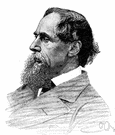dick·ens
(dĭk′ənz)n. Informal
1. A reprimand or expression of anger: gave me the dickens for being late.
2. Used as an intensive: What in the dickens is that?
[Alteration of devil (influenced by the name Dickens).]
American Heritage® Dictionary of the English Language, Fifth Edition. Copyright © 2016 by Houghton Mifflin Harcourt Publishing Company. Published by Houghton Mifflin Harcourt Publishing Company. All rights reserved.
dickens
(ˈdɪkɪnz)n
informal a euphemistic word for devil: what the dickens?.
[C16: from the name Dickens]
Dickens
(ˈdɪkɪnz)n
(Biography) Charles (John Huffam), pen name Boz. 1812–70, English novelist, famous for the humour and sympathy of his characterization and his criticism of social injustice. His major works include The Pickwick Papers (1837), Oliver Twist (1839), Nicholas Nickleby (1839), Old Curiosity Shop (1840–41), Martin Chuzzlewit (1844), David Copperfield (1850), Bleak House (1853), Little Dorrit (1857), and Great Expectations (1861)
Collins English Dictionary – Complete and Unabridged, 12th Edition 2014 © HarperCollins Publishers 1991, 1994, 1998, 2000, 2003, 2006, 2007, 2009, 2011, 2014
dick•ens
(ˈdɪk ɪnz)n.
devil; deuce (usu. prec. by the).
[1590–1600]
Dick•ens
(ˈdɪk ɪnz)n.
Charles (John Huf•fam) (ˈhʌf əm) ( “Boz” ), 1812–70, English novelist.
Dick•en•si•an (dɪˈkɛn zi ən) adj.
Random House Kernerman Webster's College Dictionary, © 2010 K Dictionaries Ltd. Copyright 2005, 1997, 1991 by Random House, Inc. All rights reserved.
ThesaurusAntonymsRelated WordsSynonymsLegend:
| Noun | 1. | dickens - a word used in exclamations of confusion; "what the devil"; "the deuce with it"; "the dickens you say" exclaiming, exclamation - an abrupt excited utterance; "she gave an exclamation of delight"; "there was much exclaiming over it" |
| 2. |  Dickens - English writer whose novels depicted and criticized social injustice (1812-1870) Dickens - English writer whose novels depicted and criticized social injustice (1812-1870) |
Based on WordNet 3.0, Farlex clipart collection. © 2003-2012 Princeton University, Farlex Inc.